SomnusNooze
If you’ve missed any of the latest news we’ve shared through our social media this month, don’t worry! Get up to date with this edition of “In Case You Missed It!”
- SAVE THE DATES: Join us for a Hypersomnia Foundation conference in Charlotte, NC!
- MUST WATCH: Christina Brundage shares her IH story and passion for advocacy and social support.
- INTERESTING READ: Learn why alcohol messes with your sleep in a NY Times article.
- TAKE ACTION: Two opportunities to advocate for the Rare Disease Community!
- IMPORTANT READ: UN Adopts Rare Disease Resolution.
- RARE DISEASE DAY: Advocate for equity for people living with a rare disease.
- READ AND SHARE: NORD Grades the U.S. on Rare Disease Policy Issues.
- BABY SLEEP DAY: Understanding the Importance of Healthy Sleep in Children.
Don’t worry if you’ve missed anything. We’ve got you covered!
SAVE THE DATES! THE HYPERSOMNIA FOUNDATION IS HOSTING A CONFERENCE IN JUNE 2022
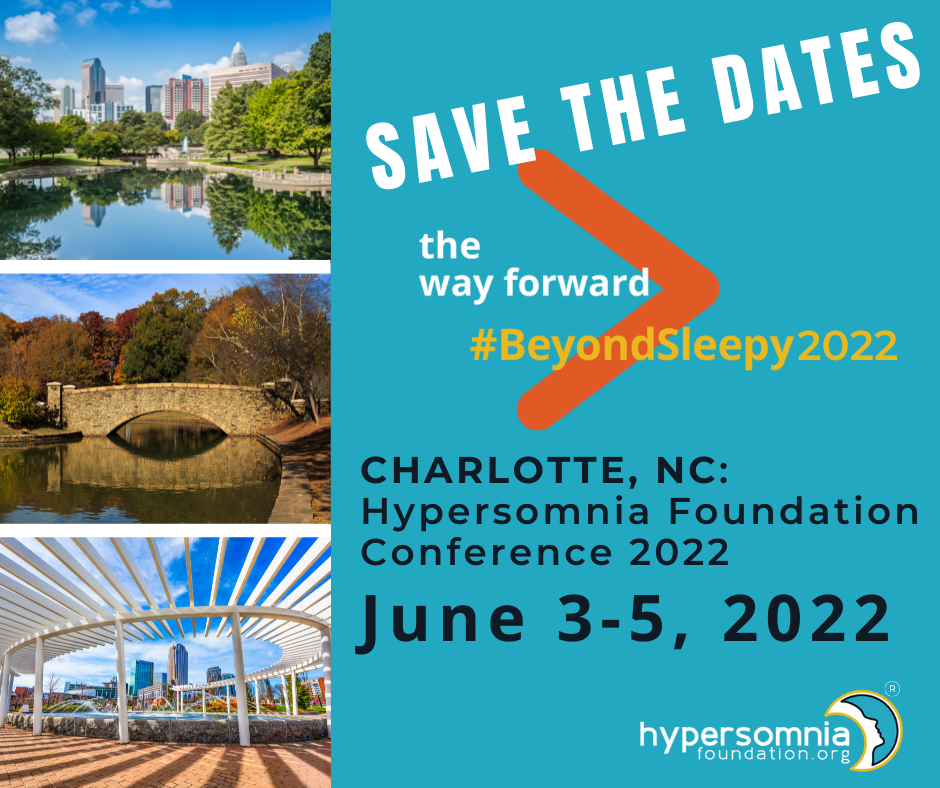 Had enough of virtual meetings? Join us in beautiful Charlotte, North Carolina from June 3 – 5, 2022 for a Hypersomnia Foundation conference for people with IH, narcolepsy & KLS, and their supporters. After such a long hiatus from meeting in person, we are planning a great mix of speakers with “news you can use,” a Meet & Greet reception, discussion groups, and more!
Had enough of virtual meetings? Join us in beautiful Charlotte, North Carolina from June 3 – 5, 2022 for a Hypersomnia Foundation conference for people with IH, narcolepsy & KLS, and their supporters. After such a long hiatus from meeting in person, we are planning a great mix of speakers with “news you can use,” a Meet & Greet reception, discussion groups, and more!
The conference begins Friday, June 3rd at 5:00 p.m. and ends at noon on Sunday, June 5th. Add to your calendar now—more info on hotels, speakers and events is coming soon via social media and our Event web page.
CHRISTINA BRUNDAGE SHARES HER IH JOURNEY LIVE ON FACEBOOK
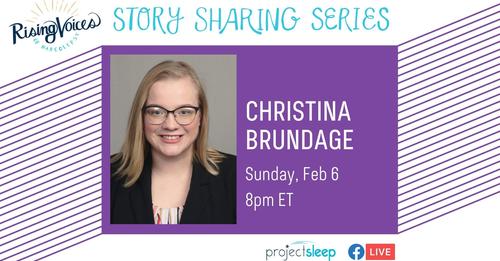 Christina Brundage, Coordinator of the Hypersomnia Foundation’s Patient Advisory and Advocacy Council (PAAC), was the featured speaker on a February 6th live broadcast of Project Sleep’s “Rising Voices of Narcolepsy” story sharing series. Christina shared her idiopathic hypersomnia story and and passion for advocacy and social support.
Christina Brundage, Coordinator of the Hypersomnia Foundation’s Patient Advisory and Advocacy Council (PAAC), was the featured speaker on a February 6th live broadcast of Project Sleep’s “Rising Voices of Narcolepsy” story sharing series. Christina shared her idiopathic hypersomnia story and and passion for advocacy and social support.
Christina is a student at the University of South Carolina Beaufort where she is majoring in public health. Christina was diagnosed with idiopathic hypersomnia at age 24 and is now working towards removing the stigma of sleep disorders. As a trained speaker with Project Sleep’s Rising Voices of Narcolepsy, she shared her story from learning of her diagnosis to working with patient advocacy organizations to raise awareness of rare disorders and help others in their advocacy journeys.
Congratulations, Christina, for graduating from Project Sleep’s “Rising Voices of Narcolepsy” program and thank you, Julie Flygare, for creating such a wonderful program that allows people share their experiences living with a sleep disorder.
Watch Christina’s episode HERE.
WHY DOES ALCOHOL MESS WITH MY SLEEP?
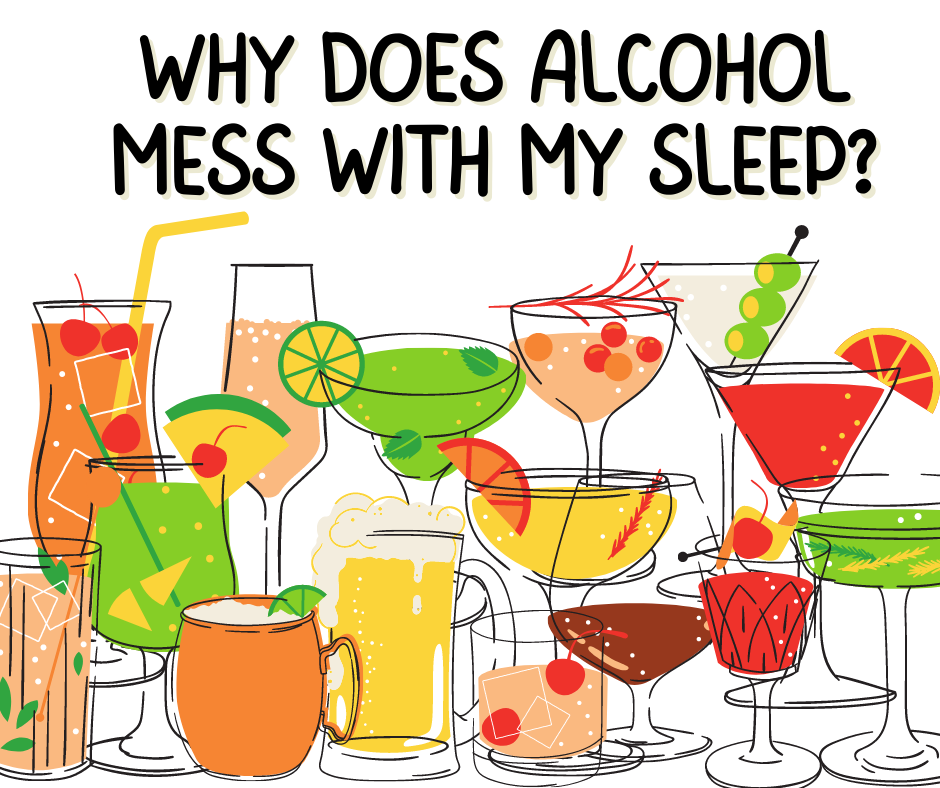 According to a recent article in the New York Times, alcohol disrupts what’s known as your sleep architecture, the normal phases of deeper and lighter sleep we go through every night. A night of drinking can “fragment,” or interrupt, these patterns and you may wake up several times as you ricochet through the usual stages of sleep.
According to a recent article in the New York Times, alcohol disrupts what’s known as your sleep architecture, the normal phases of deeper and lighter sleep we go through every night. A night of drinking can “fragment,” or interrupt, these patterns and you may wake up several times as you ricochet through the usual stages of sleep.
Read an article summary in the online edition of Sleep Review Magazine, which includes a link to the full New York Times article.
TAKE ACTION! TWO OPPORTUNITES TO ADVOCATE FOR THE RARE DISEASE COMMUNITY
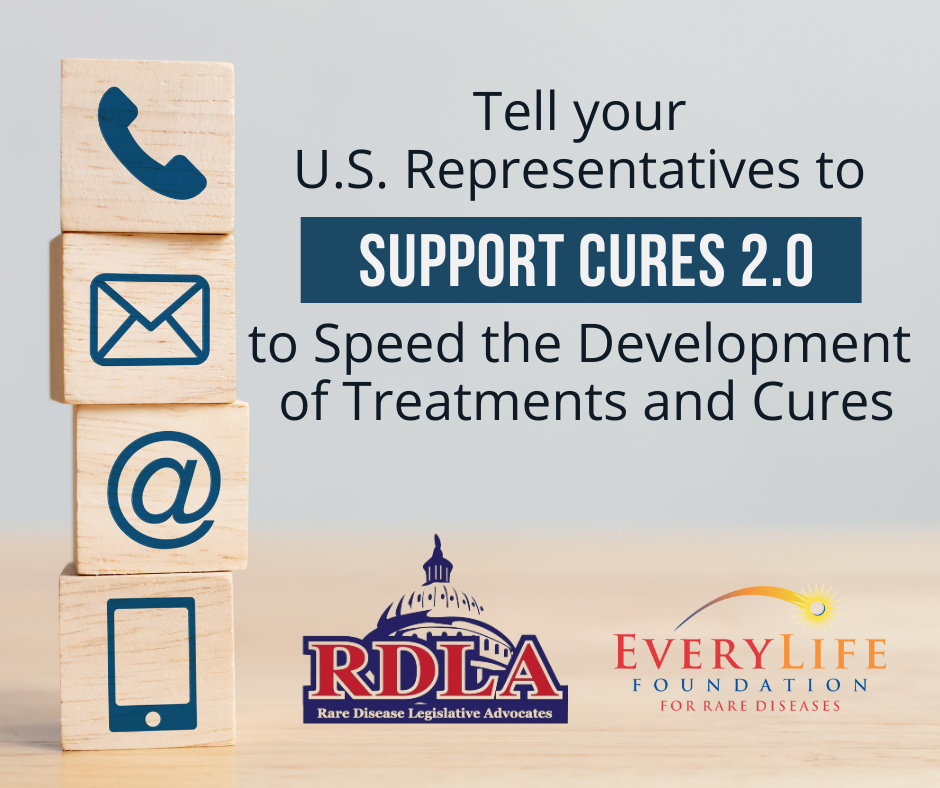 Support the U.S. CURES 2.0 BILL, H.R. 6000
Support the U.S. CURES 2.0 BILL, H.R. 6000
Ask your U.S. Representatives to support the newly introduced Cures 2.0 bill, H.R 6000. This bill is designed to revolutionize how the U.S provides care to patients, including provisions aimed at speeding up the delivery of groundbreaking cures, treatments, and innovations for rare disease. Contact your U.S. Representatives now.
Additional Details about the Cures 2.0 bill—
U.S. Representatives Degette (D-CO) and Upton (R-MI) introduced the Cures 2.0 bill on November 16, 2021. Cures 2.0 will further support and improve the health of rare disease patients by:
- Establishing additional inter-center institutes at the Food and Drug Administration, including the creation of a Rare Disease Center of Excellence to address the unique challenges of rare diseases.
- Creating a new agency called Advanced Research Projects Agency for Health (ARPA-H), which is aimed at ending some of the world’s most difficult diseases.
- Increasing access to telehealth services for Medicare and Medicaid patients, including those covered under the Children’s Health Insurance Program, known as CHIP, to ensure more Americans are getting the help they need, when they need it.
- Improving FDA-CMS communications regarding transformative new therapies
- Increasing use of real-world evidence.
- Expanding access to genetic testing.
- Providing patients with more information about the illness they face and the treatment options available to help improve their role in the decision-making process.
Visit the EveryLife Foundation for Rare Diseases website for more information and other action items you can support.
Support the U.S. STAT Act, H.R. 1730/S. 670
The Speeding Therapy Access Today, or STAT Act, H.R. 1730/S. 670, is a United States bipartisan bill that was created with the input of the rare disease community aimed at improving the development of and access to therapies for the rare disease community. Contact your Members of Congress and ask them to co-sponsor the U.S. STAT Act!
Additional details about the STAT Act—
The centerpiece of the STAT Act is the creation of a Rare Disease Center of Excellence at the U.S. Food and Drug Administration. The STAT Act will:
- Accelerate rare disease therapy development,
- Optimize interagency coordination,
- Advance science-based regulatory policies, and
- Facilitate access to therapies.
We need to make sure Members of Congress know the rare disease community needs—and expects—them to act by cosponsoring this bill today. Learn more at the EveryLife Foundation for Rare Diseases website.
You can make a difference by making your voice heard!
UN ADOPTS RESOLUTION INCREASING VISIBILITY OF RARE DISEASE
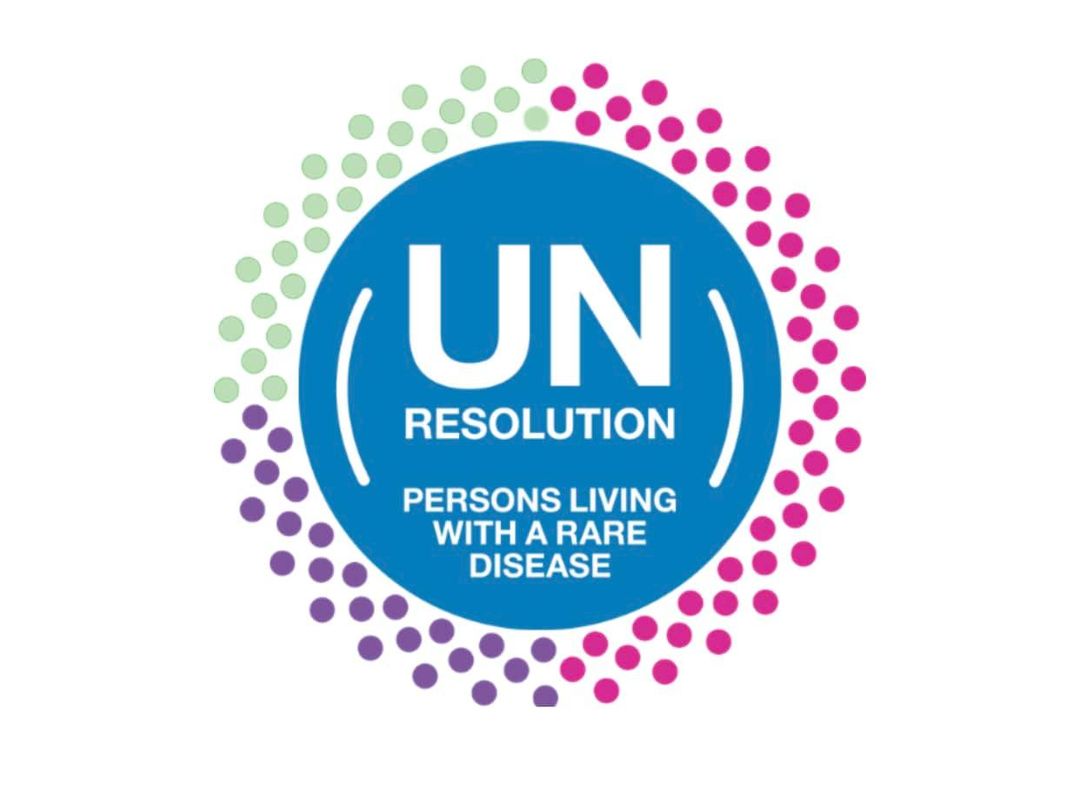 The UN has adopted the first-ever United Nations Resolution to increase visibility for the 300 million persons living with a rare disease. A global grassroots campaign led by persons living with a rare disease and their families has succeeded in securing the adoption of the UN Resolution on “Addressing the Challenges of Persons Living With a Rare Disease and Their Families.”
The UN has adopted the first-ever United Nations Resolution to increase visibility for the 300 million persons living with a rare disease. A global grassroots campaign led by persons living with a rare disease and their families has succeeded in securing the adoption of the UN Resolution on “Addressing the Challenges of Persons Living With a Rare Disease and Their Families.”
The Resolution focuses on the importance of non-discrimination and advances key pillars of the UN Sustainable Development Goals, including access to education and decent work, reducing poverty, tackling gender inequality, and supporting participation in society.
Anders Olauson, Chair of the NGO Committee, stated: “The UNGA Resolution illustrates the power of the global community. Individually, rare diseases are rare, but together persons living with a rare disease constitute a significant community deserving of UN support and recognition. Together, we are a powerful and inspirational voice.”
Learn more at the Rare Diseases International website.
A RARE REPORT CARD: NORD GRADES THE U.S. ON RARE DISEASE POLICY ISSUES
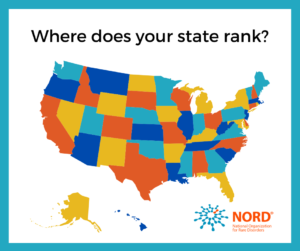 The National Organization for Rare Disorders (NORD®) recently published the latest edition of its annual State Report Card, which rates all 50 states and Washington, DC on the most important issues affecting the more than 25 million Americans living with a rare disease.
The National Organization for Rare Disorders (NORD®) recently published the latest edition of its annual State Report Card, which rates all 50 states and Washington, DC on the most important issues affecting the more than 25 million Americans living with a rare disease.
- Only six states received an A grade on protecting patients from increasingly high prescription drug out-of-pocket costs.
- 21 states signed legislation into law creating a Rare Disease Advisory Council. These councils give rare disease patients a unified voice in state government and act as an advisory body to government leaders.
Heidi Ross, NORD’s Acting Vice President, Policy and Regulatory Affairs, said about the NORD State Report Card project, “Our goal was to create an easy-to-use resource to evaluate how effectively states were serving individuals and families living with rare diseases, provide insight into the advances being made across the country, and identify where we still need to work together and focus our attention.”
Visit the NORD website for more information and to view or download the full state-by-state report cards, including maps, patient stories, and resources.
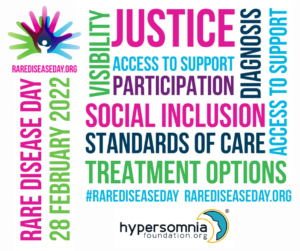 February 28th was Rare Disease Day! A day dedicated to raising awareness and fighting for equity for the 300 million people living with a rare disease around the world.
February 28th was Rare Disease Day! A day dedicated to raising awareness and fighting for equity for the 300 million people living with a rare disease around the world.
What does equity mean for people living with a rare disease?
Equity means meeting people’s specific needs and eliminating barriers preventing their full participation in society. For people living with a rare disease, equity means social opportunity, non-discrimination in education and work, and equitable access to health, social care, diagnosis and treatment.
This Rare Disease Day, we call for action for people living with a rare disease to have equal opportunities to realize their full participation in family, work, and social life.
To better understand the issues facing those living with a rare disease and learn how to directly address policymakers locally, nationally, and internationally, read and/or download “Equity for People Living With a Rare Disease.”
BABY SLEEP DAY EMPHASIZES THE IMPORTANCE OF HEALTHY SLEEP IN CHILDREN
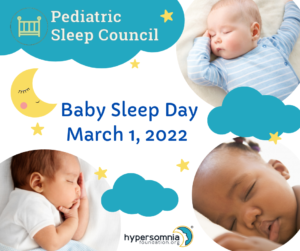 March 1st is a day of global awareness emphasizing the importance of healthy sleep in children and helping families recognize possible sleep issues early in a child’s life.
March 1st is a day of global awareness emphasizing the importance of healthy sleep in children and helping families recognize possible sleep issues early in a child’s life.
According to the American Academy of Pediatrics, sleep issues affect 25 to 50% of children and 40% of adolescents. The Hypersomnia Foundation understands the difficulties families can face when seeking a diagnosis if they suspect a possible sleep disorder is affecting their child.
To learn more about the challenges in diagnosing narcolepsy and idiopathic hypersomnia, particularly in pediatric populations, watch our video presentation by Dr. Kiran Maski, a child neurologist and sleep medicine specialist at Boston Children’s Hospital, who is also a member of the Hypersomnia Foundation’s Medical Advisory Board. Dr. Maski has created a hypersomnia clinic at BCH, where she sees children and young adults with central nervous system hypersomnia conditions from all over the world.
